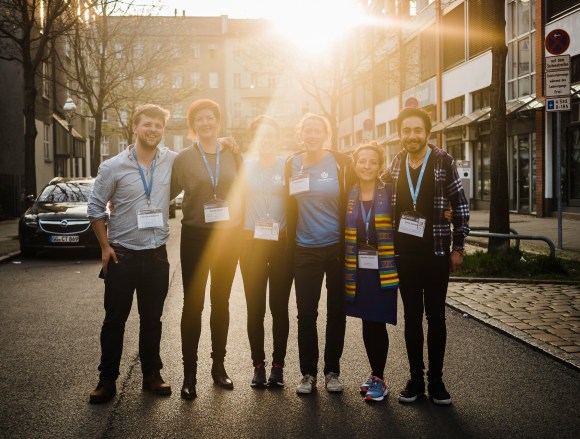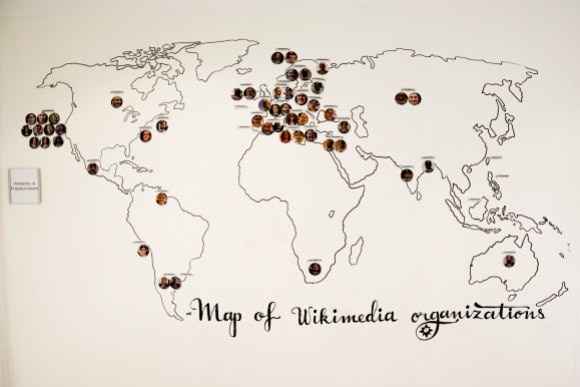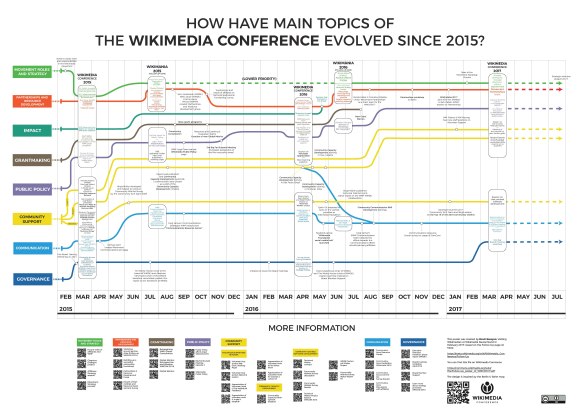
My story begins with a short episode at the Wikimedia Armenia office. After the 2016 Wikimedia Conference, my colleague Lilit Tarkhanyan sent me a link to a new project from Wikimedia Germany (Deutschland) and said that I should check it out.
The project was their Visiting Wikimedian program, and it became a turning point for me. I explored the project and its requirements, read Teele Vaalma’s previous experience, and felt like it was a crazy idea, one that I had almost no shot at being selected. Still, I also knew that I had to try.
Luckily, there was an opportunity waiting for me: Nicole Ebber and Cornelius Kibelka offered me a three-month internship to work with them.
It took me some time to master how to introduce my new role. I was new not only to Wikimedia Germany but (for the most part) the Wikimedia movement, so it was important to introduce myself properly during each meeting or call. Now I’ll do it for you too:
Hi, my name is Davit Saroyan, the Program Manager of Wikimedia Armenia. I was at Wikimedia Germany because I had been selected to be the 2017 Visiting Wikimedian, where I mostly supported that year’s Wikimedia Conference team—especially Cornelius Kibelka. The Visiting Wikimedian program aims to pass knowledge from the German chapter to other Wikimedia affiliates. After being there for three months, I returned back to use my learnings at my home chapter.
First steps in Berlin: Wikimedia Germany
Having made it to Germany, I found myself waiting for a train in an underground station. I would soon work at a foreign organization for the first time in my life. I was excited. I had doubts. I had fears. “Einsteigen, bitte” (Get in, please), the automatic voice said from the arrived train. I got in.
I was introduced to Wikimedia Germany, its departments, activities and people. I entered every department, and staff members were very kind to tell me about their work and experiences. I learned about the amazing and collaborative work they do and how this work comes together to create something great. The working language for me was English, which was unusual and hard. I struggled a lot when communicating and completing tasks, but also felt like I was communicating more and more easily with every new day.
When in the office, I sat with the Event Management team—Daniela Gentner, Wenke Storn and Mona Huber, who were amazing people as always.
Exploring the Wikimedia movement
Among my first tasks was one that I think of as my first big step toward exploring the Wikimedia movement from the German perspective. I was to draw a large map of the world without borders on one of the drawable walls in the office, marking the locations of every Wikimedia organization with the photos of their board chairs and executive directors.

This task helped me visually express the diversity of Wikimedia organizations, get to know their heads, and understand the distributions of the chapters all over the world (you can clearly see the gaps, I suspect). Having not been to an international Wikimedia conference before, building this graphic threw the movement’s diversity into stark relief.
Another major task given to me was to create an infographic, based on the follow-up page from previous Wikimedia Conferences, that reflected the important topics of the Wikimedia Conference, their connections, and how they have evolved since 2015. I took the colors and design from the Berlin Underground (U-Bahn) map, which I saw every day, researched, mapped the connections, defined the timeline, and used my visualization skills to draw it. Though I had known about some of the turning points before, this poster gave me a clearer view of the whole image of interconnected events in the Wikimedia Movement.

And finally, when organizing a party quiz game, I had to go through many wiki related pages looking for interesting facts on the Wikimedia Movement. I stumbled upon interesting stories, learnings, and facts that I did not know before.
Supporting the Wikimedia Conference program
The most important work I did was to support the design and implementation of the Wikimedia Conference’s program. I will not go into details of the program design because the information is available on Meta, but instead I will highlight my most valuable learnings.
The registration process was almost over, and we had lots of data to work with. Our first task was to analyze the data, identify, and evaluate the needs and find appropriate people who would accomplish this need at the conference. I learned how to analyze and cluster the answers of participants, find key words, group them, and come up with potential topics. Cornelius, who has much more experience in this work, helped me understand how these topics can be transformed into real sessions, how the need can be matched and connected to the potential speakers in order to accomplish this need. These sessions would later form the final conference program.
After designing sessions, finding speakers and having their approval, Cornelius came up with the nice idea of having calls with the speakers to make these sessions better. There are a lot of learnings behind this idea, that’s why I’ve written a learning pattern.
Communication and some social events
The Wikimedia Conference team noticed my passion for graphic design and started giving me more tasks in that area. This led to me making almost all the signage and posters that people saw at the Wikimedia Conference. I also designed the “How to survive in Berlin” conference guide. All of these would have been impossible without Wikimedia Germany’s style guide.
Long before me, Wenke Storn initiated the “Buddy Project” to make the conference more social by helping newcomers integrate into it. After my arrival, I also became involved in this project, and I later—with Chiara Weiß, a volunteer from the federal volunteers service—were charged with carrying it out. More on the project and what we learned from it is available on Meta-Wiki.
These are the major projects and tasks I worked on during my time at Wikimedia Germany. I have to thank the conference team for their incredible help. They helped me to learn. They helped me to feel welcome.
The conference
This will be the most emotional part. After being involved with the conference team for almost three months, I still had little idea of how the conference would actually look like—again, I’d never been to one before. When it began, I was at the registration desk when people started streaming in, and in one of the conference rooms when sessions were running. The atmosphere was magical. The people I’ve emailed, and met only through a screen, are now real. I met many wonderful people in person. I had conversations with many of them about the Wikimedia movement in their communities. I was amazed by the diversity of their communities and activities. I was amazed by the Wikimedia movement as a whole.
The conference was when I realized how connected I was to the conference team that made all of this magic happen. I felt like I could not work or be anywhere else, and I now miss those days, my team, and the German chapter a lot.
My story ends with another flashback, this time at Wikimedia Germany’s office, after the end of the conference. After hugging Daniela, Wenke, Mona and saying goodbye, Wenke told me that “There are two things you should definitely take back with you to Armenia: your memories of Berlin and your pride for being a part of the Wikimedia Conference”.
Davit Saroyan, Program Manager
Wikimedia Armenia
Would you like to be the next Visiting Wikimedian for the Wikimedia Conference 2018 at Wikimedia Germany? The next application process will start in September/October this year. Check the page on Meta for updates.
If you would like to learn more about the Wikimedia Conference 2017 in Berlin and its outcomes, check out the recently published conference report.

Can you help us translate this article?
In order for this article to reach as many people as possible we would like your help. Can you translate this article to get the message out?
Start translation